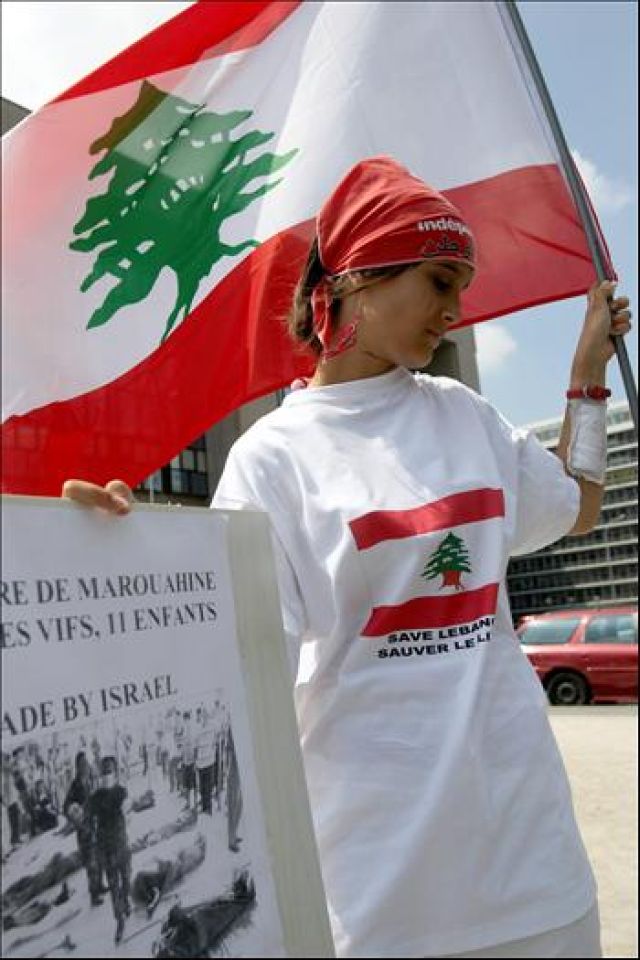
The Israeli government agreed “in principle” on November 17 to withdraw from the northern part of Ghajar, a village in the occupied Golan Heights. The village was conquered by Israel in 1967, during the six-day war.
In 2000, Ghajar was split in two. The northern part was to be controlled by Lebanon, the southern part by Israel. The southern part of Ghajar was deemed by the United Nations (UN) to be a part of the Golan Heights, Syrian territory occupied by Israel since 1967.
Ghajar residents identify as ethnically Syrian, and have opposed attempts to divide their village. They have demanded that they be recognised as Syrian refugees in Lebanon, Yalibnan.com said on December 11, 2009.
Israel reoccupied northern Ghajar after its 2006 invasion of Lebanon.
Under the recent deal, the UN will replace the Israeli military with its own soldiers. Its special coordinator for Lebanon, Michael Williams, welcomed the agreement, calling it an “important step toward the full implementation of 1701”.
UN resolution 1701 defined the terms of the ceasefire that ended Israel’s 2006 military assault on Lebanon.
However, most Lebanese commentators have said that the withdrawal does not go nearly far enough.
According to Agence France-Presse on November 22, Hezbollah MP Mohammed Raad said: “The Israeli withdrawal from the northern sector of Ghajar, placing it under the tutelage of the United Nations, preventing the Lebanese army from deploying and keeping civilian affairs in the hand of the Israeli enemy, which occupies the southern sector of the village, is not a pullout.”
Instead, Hezbollah demanded Israel withdraw it troops from Lebanon completely. This includes the Shebaa Farms, a water-rich area, which both Lebanon and Syria agree is a part of Lebanon, but which Israel claims is part of the occupied Golan Heights.
The Lebanese government has not yet officially reacted to the deal. But a Lebanese government diplomat told Lebanese newspaper Nahar on September 28 that the government would not consider the withdrawal complete until the Lebanese army was deployed in the village.
The diplomat also called for Israel to withdraw from the Shebaa Farms.
It has taken Israel almost four and a half years to carry out the withdrawal agreed upon in the UN resolution.
This is part of a pattern whereby Israel has ignored the terms of the ceasefire resolution and continued to threaten Lebanon, which it has invaded in 1967, 1978, 1982 and 2006.
In June 2007, the UN reported a “significant increase in Israeli air violations, through jet and unmanned aerial vehicle overflights of Lebanese territory”.
These violations “occur[ed] on an almost daily basis, frequently numbering between 15 and 20 overflights, and even reaching 32, in a single day”.
The air space violations have been maintained ever since and sometimes draw Lebanese gunfire.
Israel has also planted what Williams described as an “espionage device” on the border. A Lebanese security official told AFP on August 3 that Israel “fired four rockets that fell near a Lebanese army position in the village of Adaysseh”.
Israeli tanks have also fired shells at villages within Lebanon. The Lebanese high command announced that Israel had fired on a Lebanese fishing boat on September 13, 2009, Press TV said. Lebanese intelligence services have also uncovered Israeli spy networks.
Hezbollah claims that Israel has violated the resolution about 6000 times since it was signed.
Israel has also refused to tell the UN or Lebanese government how many cluster bombs it used in its 2006 invasion and where they were dropped. The UN has estimated that 1 million unexploded cluster bombs were left in Lebanon.
Meanwhile, there has been media speculation that UN-sponsored Special Tribunal of Lebanon (STL), set up, according to its website, to “prosecute persons for the death of former Lebanese Prime Minister Rafiq Hariri”, may charge members of Hezbollah.
Beirut-based Palestinian-American journalist Ahmed Moor wrote on Guardian.co.uk on November 21: “Many in Lebanon are sceptical of the STL, which, for a variety of reasons, has little credibility in the country.”
This is because many Lebanese “suspect that the STL is a foreign-sponsored attempt to undermine Hezbollah's democratic — it's a political party with elected parliamentary members — support among Lebanese citizens”.
On November 3, US ambassador to the UN said: “The United States is pleased to announce that we will transfer an additional $10 million to the Special Tribunal for Lebanon. This brings total US funding for the Tribunal to $30 million since its inception.”
Already, calls have been made to use the tribunal’s findings to justify a military confrontation with Hezbollah, in the name of “democracy” and fighting Iran.
Josh Block, a former spokesperson for the American Israel Public Affairs Committee, wrote in the magazine Foreign Policy on November 11: “The Obama administration must decide to resist the ‘resistance’ and lead the West in a program to further empower Lebanese civil society and aid the dormant democratic forces in the country …
“The administration must make a clear public signal that the United States will not sit on the sidelines while Iran, through its satraps Syria and Hezbollah, successfully exports the Iranian revolution to Lebanon.”
On November 22, Lebanon celebrated its 67th Independence Day. But the celebrations are cautioned by the fact that Lebanese independence has been compromised from its beginning.
A November 22 editorial in the Lebanese Daily Star summed up the problem: “How, exactly, can Lebanon consider itself independent? Take the enemy in the south (Israel), which never fails to seize an opportunity to sow terror and discord, never ceases to disrupt security and undermine sovereignty, flouting Lebanese territory with insouciance.
“Then there are the regional and international players. Close and not-so-close neighbours, Western heavyweights and former colonialists clamber for a footing in Beirut upon which they battle to air their Middle Eastern grievances. They have interfered with every aspect of Lebanese daily life: security, defence, economy — even religion.”